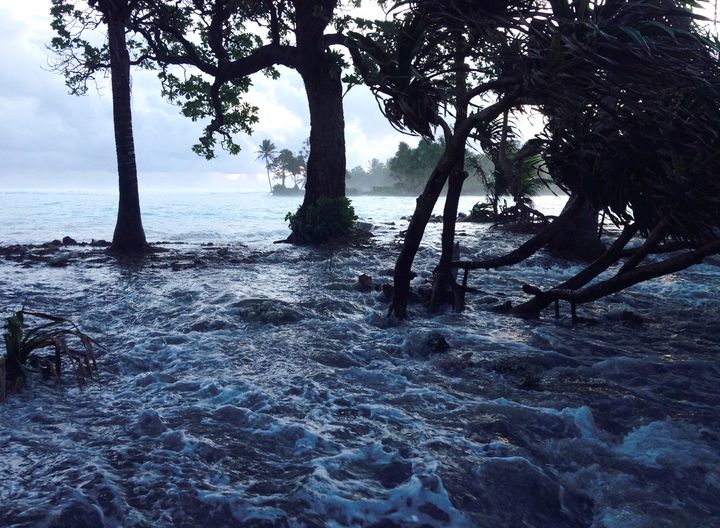Peter Mellgard is a deputy editor of Noema Magazine and the editor of the Berggruen Press.
The Marshall Islands, a network of small islands in the South Pacific, is one of the countries most at risk of the dangers of climate change. The roughly 50,000 people who call the Marshalls home are facing rising sea levels, increasingly violent storms, drought and flooding.
Last year, an especially high tide inundated several of the islands, including Majuro, the largest and most populous. Parts of the island were under water. Hundreds of people had to flee their houses. The president said later that his people “stand to lose everything.”
In November, world leaders will meet in Paris for a conference on climate change. This week, in a joint interview with The WorldPost and Al Jazeera America, Tony de Brum, the foreign minister of the Marshall Islands, discussed global warming and his goals for the Paris talks.
Christiana Figueres, the U.N. climate chief, recently said that no matter what countries pledge in Paris, we’ll still be on track for a 3-degree rise in global temperatures. What is your reaction to that?
We want to keep everything under 2 degrees — under 1.5 degrees, if possible. We want the world to keep that as a goal. For us, anything more than that is not an option. It means that the islands will go under. For the Marshalls, for 39 atolls in the Federated States of Micronesia, for three atolls in Palau, for Maldives, for Tokelau — anything over 2 degrees is catastrophic.
That is why we’ve been insisting that the language be kept — the language we agreed to many years ago — of 1.5 to 2 degrees of global warming. And that there be a five year cycle of negotiations so that people can ratchet up their commitments and respond to science and technology on a much quicker basis.
If you wait too long and, for example, set a ten-year plan in 2020, we’d return to the negotiating table in 15 years. That’s too much time — too long for small vulnerable islands. It would reach a point where there are more irreversible consequences of climate change than there are solvable ones. Adaptation and dealing with the impacts of climate change become a lot more expensive. We need to do something about it now.
 NESS KERTON via Getty Images
NESS KERTON via Getty ImagesAnd we’re also insisting that the Green Climate Fund be fully funded ($100 billion in place) so that vulnerable countries have assurances and confidence that there is a way out of this.
We also support the renewed interest in local carbon taxes. Because even though we do not have nearly enough carbon emissions to be concerned about our own carbon tax issues, what happens in the large-emission countries affects us more than it affects them.
We’re working to make sure that what comes out of Paris is something that is important to us all. Because it cannot be something that the big emitters consider to be a victory at our expense and vice versa. For this thing to work, it has to have something for everyone.
Are you hopeful that your agenda will be carried through Paris?
Of course I am hopeful! We have to be hopeful — especially small island countries, small economies that don’t carry so much weight in world politics and the world economy. We have to be forceful in our efforts to be the source of climate consciousness for people who may not have such a clearly defined view of what this climate change controversy is all about.
 AFP via Getty Images
AFP via Getty ImagesIt’s incumbent on small vulnerable states to carry that burden, even if sometimes it might seem that you’re a cockroach trying to pick a fight with an elephant. The survival of 100 million people is the same to us as the survival of 100,000. Or less.
How do people at home feel? Are they as hopeful as you? Or do they look around and think that nothing’s going to happen?
Well, if you walk down the road in Majuro and ask people, “Do you want to move away from this island? Do you want your island to be underwater?” What do you think they’d say? The answer is obvious.
I have nine — soon to be 10 — grandchildren and four great-grandchildren, and the ocean has always been part of our life. We are ocean people. You can’t separate an islander from the ocean. In Marshallese, the word for land is just an upswell of dry land. Basically it’s the connection between ocean and lagoon. Nothing more. But it’s something to which you belong. It’s like hanging on to a life vest.
It’s incumbent on small vulnerable states to carry that burden, even if sometimes it might seem that you’re a cockroach trying to pick a fight with an elephant.
Especially when it begins to act like it is — we’ve had westerly winds in Majuro now since July 3. It’s the longest in history that we’ve had strong westerlies. This morning’s weather shows winds of 20 to 25 knots from the west. Our civil aviation authorities have already modified the approach to our international airport because you can no longer count on landing west to east. The beaches that face west have already eroded.
You do not need workshops or conventions or youth group rallies to remind people that climate change is here. It’s already so much part of life. We have to deal with droughts in the northern marshes and floods in the southern marshes — all at the same time.
As some of our elders have been saying, “Nature has gone crazy. She doesn’t want you to understand what she’s doing anymore.”
De Brum’s comments have been edited for clarity.
CORRECTION: An earlier version of this story misspelled the name of the Marshall Islands’ foreign minister. It is Tony de Brum, not Tony de Blum.





